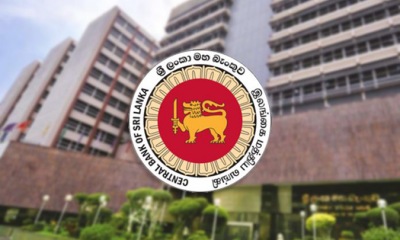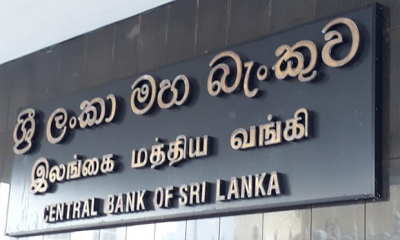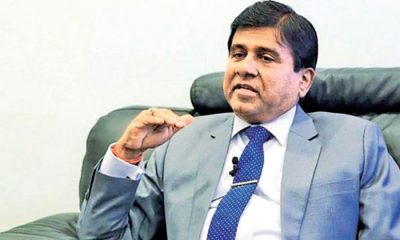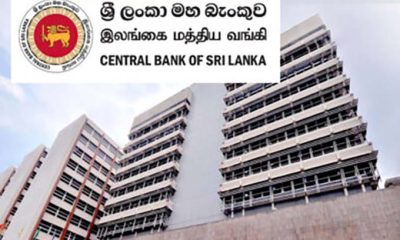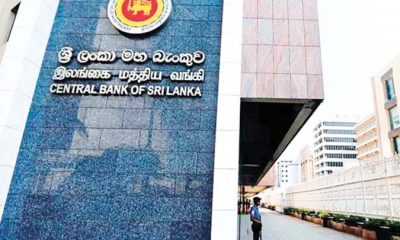Features
24-year-old collective agreement had to be honoured and precedents followed: CBSL Governor
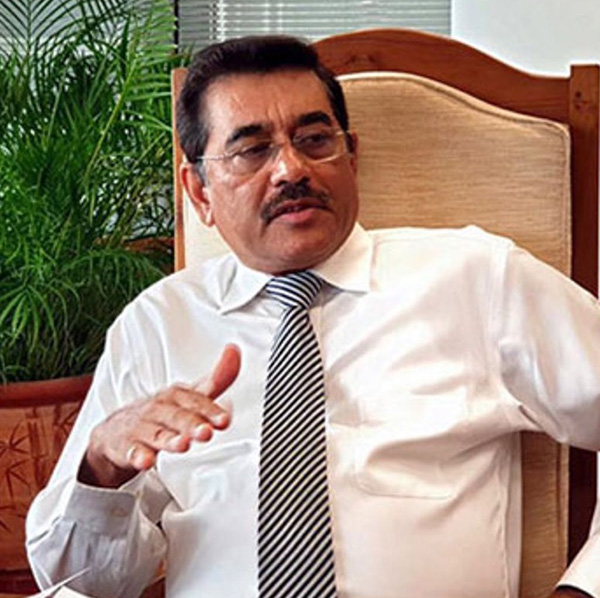
Pay hike controversy:
Public concerns won’t go unheeded
‘My pay hike is zero’
Governor’s salary lower than those of many others at CBSL
About 100 central bankers have left for overseas jobs since 2022
Newly-passed CBSL Act had nothing to do with triennial pay revision
by Saman Indrajith
The CBSL (Central Bank of Sri Lanka) pay hike controversy apparently refuses to go away. Hardly a day passes without it being taken up in Parliament or elsewhere. The person in the crosshairs of the critics of the CBSL in general and the pay revision in particular is CBSL Governor Dr. Nandalal Weerasinghe.
Has the CBSL departed from the established procedures, processes and practices in effecting the latest pay increases, which reportedly range from 29% to 70%? Do the Central Bankers deserve the salaries they are drawing? Is it fair for the CBSL minor staffers to be given higher salaries than some senior public officials? Has the CBSL Governor benefited from the controversial pay revision, and is he the highest paid Central Banker? How does he feel when some of his critics bay for his blood, in a manner of speaking?
Despite his hectic workload aggravated by numerous meetings on the IMF bailout programme and other economic recovery measures, Dr. Weerasinghe took time off his busy schedule, on Tuesday, to field the aforesaid questions and some more, in a brief interview with The Island.
Excerpts:
Q: How big is the pay hike you have got as the CBSL Governor from the recent salary revision?
A: My pay hike is zero. I have not received a pay hike from the recent salary revision, which only applies to CBSL employees up to the Deputy Governor level. My salary, as the Governor, is lower than those of many CBSL staff including some officials in lower grades. I have no complaints at all about my salary as I hold this position only due to my desire to help the economy recover from its worst crisis by using my experience and knowledge as a career central banker.
Q: But you are entitled to an attractive pension as CBSL Governor. aren’t you?
A. Although the previous CBSL administration made former Governors eligible for a pension irrespective of the length of their tenure, some of them have refused to claim their entitlement. I have also declared that I will not claim any pension benefits from CBSL for my tenure as Governor CBSL.
Q: However, you never had it so good, as your critics say. You now have an official house, official vehicles and other perks, don’t you?
A: I would not say I have never had it so good. Yes, I am entitled to an official residence, vehicle and some other perks like many other public servants. However, once such perks are added as non-cash benefits for taxation purposes, my take-home salary is significantly lower than my gross salary as caps imposed on non-cash benefits that are usually applied to the salaries of public servants are not applicable to the Governor’s salary.
Q: If you think your position as CBSL Governor is not financially rewarding, why did you return from retirement?
A: After my retirement, I moved to Australia with the intention of spending more time with my family as I could not spend quality time with them during the three decades of my career at CBSL. When I was asked whether I could come back and help the country at its darkest hour, I felt a moral obligation to accept the position, despite knowing that it would be detrimental to my family and financial position, when compared to my earning potential as an independent professional. I believe that any loyal countryman would have made the same decision at that time, given the severity of the situation.
Q: It is being argued in some quarters that the CBSL has been able to grant its employees pay hikes arbitrarily because of the newly-passed CBSL Act, which is believed to have given the CBSL unbridled independence. Isn’t it true?
A: The new CBSL Act has nothing to do with the recent salary revision. Since the establishment of CBSL under the provisions of previous law (Monetary Law Act of 1950) salary revisions have been done by the Board of CBSL. Since 1991, such revisions have been done once every three years. Collective agreements have been used to formalize such revisions since 2000, similar to many other public corporations and private sector entities.
Q: Who decided on the salary revision at issue?
A: In the process of collective agreements, salary revisions are decided based on several rounds of intense negotiations between all trade unions and management with the intention to reach a consensus among all parties. Some trade unions are directly affiliated to the existing major political parties while others are independent, representing only the interests of CBSL employees.
Q: If so, why are you drawing all the flak? And, why don’t you tell the public that you alone cannot be held responsible for that?
A: I believe this news has affected different groups of people in different ways. Some people feel very strongly about it. In such circumstances, it is only natural that I have drawn their ire as the head of the institution and perhaps the most public facing entity of CBSL. My goal is to understand the genuine concerns raised by the dissatisfied groups and to restore trust in the CBSL, and therefore I do not think it is prudent for me to distance myself from the issue and deflect.
Q: If you had not returned to accept the post of CBSL Governor after retirement, and had chosen to work for an international organization after the mandatory cooling-off period, would you have earned more than the salary of the CBSL Governor? It is being claimed via social media that you would have had to settle for an ordinary job in Australia if you had not been called from retirement to head the CBSL. What have you got to say to this?
A: I didn’t have any intention to engage in any full-time job after my retirement from CBSL. At the same time, I didn’t want to waste my knowledge and experience which I gained over three decades. I enjoyed my retirement life by conducting my own research and assisting some multilateral organizations and international firms whenever they sought my expertise on a part-time basis while enjoying time with my family and finding more time to travel. In fact, my retirement life was much more financially rewarding than my career at CBSL even as a Deputy Governor.
Q: Don’t you think the blame for the current economic crisis should be apportioned to the CBSL as well? Isn’t it true that the CBSL failed to warn the government against an impending foreign currency reserves crisis?
A: It is clearly evident in the recent Supreme Court case on the economic crisis that the CBSL officials had warned the then Governors, the Monetary Board and the Ministry of Finance about the impending economic crisis but such warnings were ignored. CBSL officials cannot make public statements or report to the Parliament on their own without permission from the Governor or the Board, under confidentiality clauses in CBSL laws. Such provisions are necessary in CBSL laws to prevent highly market sensitive and confidential information being leaked. Therefore, the CBSL professional staff cannot be blamed for the current economic crisis.
Q: Why do you think the CBSL Executive Grade officers deserve the salaries they draw? Do you think they could earn more if they join the private sector or international institutions? And, how many of them have left CBSL in recent years for better prospects?
A: Only a limited number of university graduates with First Class or Second Class Upper, who score highest at a competitive examination held independently, join the CBSL as Executive Grade officers. They are the top candidates who would easily obtain employment elsewhere if the CBSL salary is not competitive. Once they reach mid-level, they are specially trained for central banking and their special skills give them a wider market reach. Between 2022 and 2024, 100 staff members left CBSL and found employment abroad.
Q: CBSL minor employees draw higher salaries than many senior public officials? Don’t you think this is unfair?
A: I admit that there exists such an anomaly, which has been a legacy issue for two reasons. First, many minor employees were recruited to CBSL between 2008 and 2010 without a rigorous competitive process. Secondly, once they are recruited, they cannot be left out in salary determination in collective agreements as they are also part of staff and members of trade unions.
Q: What have you got to say to those who are out for your scalp?
A: I would like to reassure the public that the recent pay rise planned at CBSL has been conducted in accordance with all proper legal avenues and in the same manner as all other pay rises at the CBSL over its history.
I also want to reassure the people that their concerns will not go unheeded, and I appreciate the voices being raised as we are determined to take this opportunity to review the way we do things. We acknowledge that these are very tough economic times for everybody and there have been ethical issues raised about the timing of these measures, etc. We hope to give these ethical issues the due consideration they deserve.
I believe in the hard-working people of the CBSL and the hard-working people of our nation. I hope that a day will dawn when every worker gets a wage that he or she is satisfied with, including at the institution under my purview and elsewhere.
Q: Don’t you feel hurt when you come under fire?
A: I would say ‘hurt’ is the wrong word to use in this instance. I do sometimes feel disappointed when my energy as well as attention is forced away from the main task that I hoped to achieve when I returned to CBSL. My intention is to work for the betterment of Sri Lanka and support the CBSL staff on that journey. This is why I have been able to make difficult decisions. This is also why I am always open to receiving feedback from genuinely concerned parties. It is, however, an unnecessary diversion of energy and time when it comes from more political and disingenuous quarters.
(The interviewer is Deputy Editor of The Island.)
Features
The heart-friendly health minister

by Dr Gotabhya Ranasinghe
Senior Consultant Cardiologist
National Hospital Sri Lanka
When we sought a meeting with Hon Dr. Ramesh Pathirana, Minister of Health, he graciously cleared his busy schedule to accommodate us. Renowned for his attentive listening and deep understanding, Minister Pathirana is dedicated to advancing the health sector. His openness and transparency exemplify the qualities of an exemplary politician and minister.
Dr. Palitha Mahipala, the current Health Secretary, demonstrates both commendable enthusiasm and unwavering support. This combination of attributes makes him a highly compatible colleague for the esteemed Minister of Health.
Our discussion centered on a project that has been in the works for the past 30 years, one that no other minister had managed to advance.
Minister Pathirana, however, recognized the project’s significance and its potential to revolutionize care for heart patients.
The project involves the construction of a state-of-the-art facility at the premises of the National Hospital Colombo. The project’s location within the premises of the National Hospital underscores its importance and relevance to the healthcare infrastructure of the nation.
This facility will include a cardiology building and a tertiary care center, equipped with the latest technology to handle and treat all types of heart-related conditions and surgeries.
Securing funding was a major milestone for this initiative. Minister Pathirana successfully obtained approval for a $40 billion loan from the Asian Development Bank. With the funding in place, the foundation stone is scheduled to be laid in September this year, and construction will begin in January 2025.
This project guarantees a consistent and uninterrupted supply of stents and related medications for heart patients. As a result, patients will have timely access to essential medical supplies during their treatment and recovery. By securing these critical resources, the project aims to enhance patient outcomes, minimize treatment delays, and maintain the highest standards of cardiac care.
Upon its fruition, this monumental building will serve as a beacon of hope and healing, symbolizing the unwavering dedication to improving patient outcomes and fostering a healthier society.We anticipate a future marked by significant progress and positive outcomes in Sri Lanka’s cardiovascular treatment landscape within the foreseeable timeframe.
Features
A LOVING TRIBUTE TO JESUIT FR. ALOYSIUS PIERIS ON HIS 90th BIRTHDAY

by Fr. Emmanuel Fernando, OMI
Jesuit Fr. Aloysius Pieris (affectionately called Fr. Aloy) celebrated his 90th birthday on April 9, 2024 and I, as the editor of our Oblate Journal, THE MISSIONARY OBLATE had gone to press by that time. Immediately I decided to publish an article, appreciating the untiring selfless services he continues to offer for inter-Faith dialogue, the renewal of the Catholic Church, his concern for the poor and the suffering Sri Lankan masses and to me, the present writer.
It was in 1988, when I was appointed Director of the Oblate Scholastics at Ampitiya by the then Oblate Provincial Fr. Anselm Silva, that I came to know Fr. Aloy more closely. Knowing well his expertise in matters spiritual, theological, Indological and pastoral, and with the collaborative spirit of my companion-formators, our Oblate Scholastics were sent to Tulana, the Research and Encounter Centre, Kelaniya, of which he is the Founder-Director, for ‘exposure-programmes’ on matters spiritual, biblical, theological and pastoral. Some of these dimensions according to my view and that of my companion-formators, were not available at the National Seminary, Ampitiya.
Ever since that time, our Oblate formators/ accompaniers at the Oblate Scholasticate, Ampitiya , have continued to send our Oblate Scholastics to Tulana Centre for deepening their insights and convictions regarding matters needed to serve the people in today’s context. Fr. Aloy also had tried very enthusiastically with the Oblate team headed by Frs. Oswald Firth and Clement Waidyasekara to begin a Theologate, directed by the Religious Congregations in Sri Lanka, for the contextual formation/ accompaniment of their members. It should very well be a desired goal of the Leaders / Provincials of the Religious Congregations.
Besides being a formator/accompanier at the Oblate Scholasticate, I was entrusted also with the task of editing and publishing our Oblate journal, ‘The Missionary Oblate’. To maintain the quality of the journal I continue to depend on Fr. Aloy for his thought-provoking and stimulating articles on Biblical Spirituality, Biblical Theology and Ecclesiology. I am very grateful to him for his generous assistance. Of late, his writings on renewal of the Church, initiated by Pope St. John XX111 and continued by Pope Francis through the Synodal path, published in our Oblate journal, enable our readers to focus their attention also on the needed renewal in the Catholic Church in Sri Lanka. Fr. Aloy appreciated very much the Synodal path adopted by the Jesuit Pope Francis for the renewal of the Church, rooted very much on prayerful discernment. In my Religious and presbyteral life, Fr.Aloy continues to be my spiritual animator / guide and ongoing formator / acccompanier.
Fr. Aloysius Pieris, BA Hons (Lond), LPh (SHC, India), STL (PFT, Naples), PhD (SLU/VC), ThD (Tilburg), D.Ltt (KU), has been one of the eminent Asian theologians well recognized internationally and one who has lectured and held visiting chairs in many universities both in the West and in the East. Many members of Religious Congregations from Asian countries have benefited from his lectures and guidance in the East Asian Pastoral Institute (EAPI) in Manila, Philippines. He had been a Theologian consulted by the Federation of Asian Bishops’ Conferences for many years. During his professorship at the Gregorian University in Rome, he was called to be a member of a special group of advisers on other religions consulted by Pope Paul VI.
Fr. Aloy is the author of more than 30 books and well over 500 Research Papers. Some of his books and articles have been translated and published in several countries. Among those books, one can find the following: 1) The Genesis of an Asian Theology of Liberation (An Autobiographical Excursus on the Art of Theologising in Asia, 2) An Asian Theology of Liberation, 3) Providential Timeliness of Vatican 11 (a long-overdue halt to a scandalous millennium, 4) Give Vatican 11 a chance, 5) Leadership in the Church, 6) Relishing our faith in working for justice (Themes for study and discussion), 7) A Message meant mainly, not exclusively for Jesuits (Background information necessary for helping Francis renew the Church), 8) Lent in Lanka (Reflections and Resolutions, 9) Love meets wisdom (A Christian Experience of Buddhism, 10) Fire and Water 11) God’s Reign for God’s poor, 12) Our Unhiddden Agenda (How we Jesuits work, pray and form our men). He is also the Editor of two journals, Vagdevi, Journal of Religious Reflection and Dialogue, New Series.
Fr. Aloy has a BA in Pali and Sanskrit from the University of London and a Ph.D in Buddhist Philosophy from the University of Sri Lankan, Vidyodaya Campus. On Nov. 23, 2019, he was awarded the prestigious honorary Doctorate of Literature (D.Litt) by the Chancellor of the University of Kelaniya, the Most Venerable Welamitiyawe Dharmakirthi Sri Kusala Dhamma Thera.
Fr. Aloy continues to be a promoter of Gospel values and virtues. Justice as a constitutive dimension of love and social concern for the downtrodden masses are very much noted in his life and work. He had very much appreciated the commitment of the late Fr. Joseph (Joe) Fernando, the National Director of the Social and Economic Centre (SEDEC) for the poor.
In Sri Lanka, a few religious Congregations – the Good Shepherd Sisters, the Christian Brothers, the Marist Brothers and the Oblates – have invited him to animate their members especially during their Provincial Congresses, Chapters and International Conferences. The mainline Christian Churches also have sought his advice and followed his seminars. I, for one, regret very much, that the Sri Lankan authorities of the Catholic Church –today’s Hierarchy—- have not sought Fr.
Aloy’s expertise for the renewal of the Catholic Church in Sri Lanka and thus have not benefited from the immense store of wisdom and insight that he can offer to our local Church while the Sri Lankan bishops who governed the Catholic church in the immediate aftermath of the Second Vatican Council (Edmund Fernando OMI, Anthony de Saram, Leo Nanayakkara OSB, Frank Marcus Fernando, Paul Perera,) visited him and consulted him on many matters. Among the Tamil Bishops, Bishop Rayappu Joseph was keeping close contact with him and Bishop J. Deogupillai hosted him and his team visiting him after the horrible Black July massacre of Tamils.
Features
A fairy tale, success or debacle

Sri Lanka-Singapore Free Trade Agreement
By Gomi Senadhira
senadhiragomi@gmail.com
“You might tell fairy tales, but the progress of a country cannot be achieved through such narratives. A country cannot be developed by making false promises. The country moved backward because of the electoral promises made by political parties throughout time. We have witnessed that the ultimate result of this is the country becoming bankrupt. Unfortunately, many segments of the population have not come to realize this yet.” – President Ranil Wickremesinghe, 2024 Budget speech
Any Sri Lankan would agree with the above words of President Wickremesinghe on the false promises our politicians and officials make and the fairy tales they narrate which bankrupted this country. So, to understand this, let’s look at one such fairy tale with lots of false promises; Ranil Wickremesinghe’s greatest achievement in the area of international trade and investment promotion during the Yahapalana period, Sri Lanka-Singapore Free Trade Agreement (SLSFTA).
It is appropriate and timely to do it now as Finance Minister Wickremesinghe has just presented to parliament a bill on the National Policy on Economic Transformation which includes the establishment of an Office for International Trade and the Sri Lanka Institute of Economics and International Trade.
Was SLSFTA a “Cleverly negotiated Free Trade Agreement” as stated by the (former) Minister of Development Strategies and International Trade Malik Samarawickrama during the Parliamentary Debate on the SLSFTA in July 2018, or a colossal blunder covered up with lies, false promises, and fairy tales? After SLSFTA was signed there were a number of fairy tales published on this agreement by the Ministry of Development Strategies and International, Institute of Policy Studies, and others.
However, for this article, I would like to limit my comments to the speech by Minister Samarawickrama during the Parliamentary Debate, and the two most important areas in the agreement which were covered up with lies, fairy tales, and false promises, namely: revenue loss for Sri Lanka and Investment from Singapore. On the other important area, “Waste products dumping” I do not want to comment here as I have written extensively on the issue.
1. The revenue loss
During the Parliamentary Debate in July 2018, Minister Samarawickrama stated “…. let me reiterate that this FTA with Singapore has been very cleverly negotiated by us…. The liberalisation programme under this FTA has been carefully designed to have the least impact on domestic industry and revenue collection. We have included all revenue sensitive items in the negative list of items which will not be subject to removal of tariff. Therefore, 97.8% revenue from Customs duty is protected. Our tariff liberalisation will take place over a period of 12-15 years! In fact, the revenue earned through tariffs on goods imported from Singapore last year was Rs. 35 billion.
The revenue loss for over the next 15 years due to the FTA is only Rs. 733 million– which when annualised, on average, is just Rs. 51 million. That is just 0.14% per year! So anyone who claims the Singapore FTA causes revenue loss to the Government cannot do basic arithmetic! Mr. Speaker, in conclusion, I call on my fellow members of this House – don’t mislead the public with baseless criticism that is not grounded in facts. Don’t look at petty politics and use these issues for your own political survival.”
I was surprised to read the minister’s speech because an article published in January 2018 in “The Straits Times“, based on information released by the Singaporean Negotiators stated, “…. With the FTA, tariff savings for Singapore exports are estimated to hit $10 million annually“.
As the annual tariff savings (that is the revenue loss for Sri Lanka) calculated by the Singaporean Negotiators, Singaporean $ 10 million (Sri Lankan rupees 1,200 million in 2018) was way above the rupees’ 733 million revenue loss for 15 years estimated by the Sri Lankan negotiators, it was clear to any observer that one of the parties to the agreement had not done the basic arithmetic!
Six years later, according to a report published by “The Morning” newspaper, speaking at the Committee on Public Finance (COPF) on 7th May 2024, Mr Samarawickrama’s chief trade negotiator K.J. Weerasinghehad had admitted “…. that forecasted revenue loss for the Government of Sri Lanka through the Singapore FTA is Rs. 450 million in 2023 and Rs. 1.3 billion in 2024.”
If these numbers are correct, as tariff liberalisation under the SLSFTA has just started, we will pass Rs 2 billion very soon. Then, the question is how Sri Lanka’s trade negotiators made such a colossal blunder. Didn’t they do their basic arithmetic? If they didn’t know how to do basic arithmetic they should have at least done their basic readings. For example, the headline of the article published in The Straits Times in January 2018 was “Singapore, Sri Lanka sign FTA, annual savings of $10m expected”.
Anyway, as Sri Lanka’s chief negotiator reiterated at the COPF meeting that “…. since 99% of the tariffs in Singapore have zero rates of duty, Sri Lanka has agreed on 80% tariff liberalisation over a period of 15 years while expecting Singapore investments to address the imbalance in trade,” let’s turn towards investment.
Investment from Singapore
In July 2018, speaking during the Parliamentary Debate on the FTA this is what Minister Malik Samarawickrama stated on investment from Singapore, “Already, thanks to this FTA, in just the past two-and-a-half months since the agreement came into effect we have received a proposal from Singapore for investment amounting to $ 14.8 billion in an oil refinery for export of petroleum products. In addition, we have proposals for a steel manufacturing plant for exports ($ 1 billion investment), flour milling plant ($ 50 million), sugar refinery ($ 200 million). This adds up to more than $ 16.05 billion in the pipeline on these projects alone.
And all of these projects will create thousands of more jobs for our people. In principle approval has already been granted by the BOI and the investors are awaiting the release of land the environmental approvals to commence the project.
I request the Opposition and those with vested interests to change their narrow-minded thinking and join us to develop our country. We must always look at what is best for the whole community, not just the few who may oppose. We owe it to our people to courageously take decisions that will change their lives for the better.”
According to the media report I quoted earlier, speaking at the Committee on Public Finance (COPF) Chief Negotiator Weerasinghe has admitted that Sri Lanka was not happy with overall Singapore investments that have come in the past few years in return for the trade liberalisation under the Singapore-Sri Lanka Free Trade Agreement. He has added that between 2021 and 2023 the total investment from Singapore had been around $162 million!
What happened to those projects worth $16 billion negotiated, thanks to the SLSFTA, in just the two-and-a-half months after the agreement came into effect and approved by the BOI? I do not know about the steel manufacturing plant for exports ($ 1 billion investment), flour milling plant ($ 50 million) and sugar refinery ($ 200 million).
However, story of the multibillion-dollar investment in the Petroleum Refinery unfolded in a manner that would qualify it as the best fairy tale with false promises presented by our politicians and the officials, prior to 2019 elections.
Though many Sri Lankans got to know, through the media which repeatedly highlighted a plethora of issues surrounding the project and the questionable credentials of the Singaporean investor, the construction work on the Mirrijiwela Oil Refinery along with the cement factory began on the24th of March 2019 with a bang and Minister Ranil Wickremesinghe and his ministers along with the foreign and local dignitaries laid the foundation stones.
That was few months before the 2019 Presidential elections. Inaugurating the construction work Prime Minister Ranil Wickremesinghe said the projects will create thousands of job opportunities in the area and surrounding districts.
The oil refinery, which was to be built over 200 acres of land, with the capacity to refine 200,000 barrels of crude oil per day, was to generate US$7 billion of exports and create 1,500 direct and 3,000 indirect jobs. The construction of the refinery was to be completed in 44 months. Four years later, in August 2023 the Cabinet of Ministers approved the proposal presented by President Ranil Wickremesinghe to cancel the agreement with the investors of the refinery as the project has not been implemented! Can they explain to the country how much money was wasted to produce that fairy tale?
It is obvious that the President, ministers, and officials had made huge blunders and had deliberately misled the public and the parliament on the revenue loss and potential investment from SLSFTA with fairy tales and false promises.
As the president himself said, a country cannot be developed by making false promises or with fairy tales and these false promises and fairy tales had bankrupted the country. “Unfortunately, many segments of the population have not come to realize this yet”.
(The writer, a specialist and an activist on trade and development issues . )


